Ars Technica
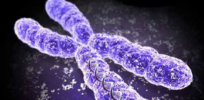
Using gene editing to merge an organism’s chromosomes into ‘one giant molecule’
Complex organisms have complex genomes. While bacteria and archaea keep all of their genes on a single loop of DNA, ...

Why it’s difficult to declare the end of an Ebola outbreak
The World Health Organization on [July 24] declared the official end of the latest outbreak of Ebola in the Democratic ...

Better than antibiotics? Bacteria-targeting viruses show potential against pneumonia
Like other cells, bacteria often find themselves victims of viral infections, dying as new viruses burst out to infect their ...

Can we delay aging by killing off old cells with powerful drug combo?
We have a good idea of what makes individual cells old. Things like DNA damage, shortened chromosome ends, and a ...
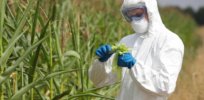
GMO crops so efficient at killing pests, adjacent non-GMO crops are also protected
One of the great purported boons of GMOs is that they allow farmers to use fewer pesticides, some of which are ...

USDA wants your opinion on its GMO labeling proposal
There's nothing inherently unsafe about genetically engineering crops or agricultural animals. ... But the public has been consistently uneasy about ...

Ars Technica decision to reject reporting on latest cellphone scare study illustrates how journalists apply science literacy
[Recently], a fellow editor emailed me a link to yet another study purporting to show that cellphone use could be ...
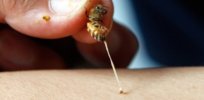
Woman’s death blamed on bee-sting acupuncture promoted by Gwyneth Paltrow’s Goop
A 55-year-old Spanish woman has died following repeated exposures to an acupuncture method that uses live, stinging bees instead of ...
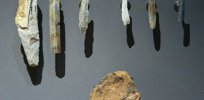
Stone tool evolution study illuminates early human development
For at least 2.6 million years, humans and our ancestors have been making stone tools by chipping off flakes of ...

Ecological vanishing act: African rainforests disappeared, then bounced back
Three thousand years ago, dense old-growth rainforests covered most of central Africa. But around 2,600 years ago, an event that ...

Male birth control: Still no pill despite 50 years of contraceptive research
Today, there are 17 female-controlled forms of contraception approved by the FDA, including the birth control pill. Yet condoms and ...

What happened to the native Caribbeans? Ancient DNA could solve mystery
The Bahamas weren’t settled until 1,500 years ago. The people who settled there are known as the Lucayan Taino, and ...

Harnessing evolution for space travel: Using biomimicry to recreate life on Mars
[E]volution has had billions of years of trial and error to produce species that are well adapted chemically and physically ...

Ancient poison used for arrows could lead to male birth control pills
According to scientists, a poison arrow in the quiver may let loose a very sticky nether-region massacre. The poison in ...

Mystery of anesthetics: Despite lack of central nervous system, plants too ‘pass out’ from ‘knock out’ drugs
Just like humans, plants can succumb to the effects of general anesthetic drugs, researchers report in the Annals of Botany. The finding ...

Gut microbiome could influence response to cancer treatment
When [cancer] drugs work, the immune system tramples tumors into oblivion. But they don’t always work—in fact, cancer drugs can ...

‘Kelp highway’–not a land bridge–likely brought first humans to the Americas
For decades, students were taught that the first people in the Americas were a group called the Clovis who walked ...
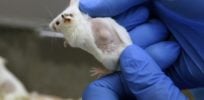
Modeling human tumors in mice can be problematic—here’s why
[A] new study [read full study] suggests that an unfortunate side effect of ... evolutionary changes is that human tumors are ...
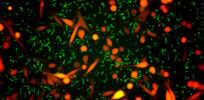
Chemotherapy drugs can be blocked by bacteria hiding in cancer cells
Of all the kinds of bacteria, some are charming and beneficial, others are malicious and dangerous—and then there are the ...

Proof of Viking warrior women? Maybe, but maybe not
In a paper published in American Journal of Physical Anthropology, Uppsala University archaeologist Charlotte Hedenstierna-Jonson and her team announced that they had, at ...

Homeopaths beware: Natural teething beads found to contain lead
A nine-month-old baby in Connecticut had dangerously high levels of lead in her blood after chewing on a homeopathic “healing ...

Twist on truth: Knowledge, such as on GMOs, can lead to a rejection of the scientific consensus
[A] new study out [August 22nd] joins a number of earlier ones in indicating that scientific knowledge makes it easier ...

Why Zika exploded in the Americas: One gene mutation?
A single mutation may explain why Zika suddenly erupted from obscurity to become the alarming re-emerging infectious disease it is ...

CRISPR may open door to personalized treatment of cancer
One thing cells must do in order to become cancerous is to overthrow the normal checks on their growth. As ...
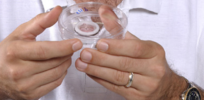
‘Brain in a dish’ gives scientists ‘unprecedented’ ability to study neurodevelopment disorders
Small cultures of human neuronal cells developing in a dish are not quite “brains in a petri dish” as they are ...

Treatments for Alzheimer’s, Parkinson’s and other forms of dementia may already be in your medicine cabinet
Tried, true, and FDA-approved drugs for cancer and depression—already in medicine cabinets—may also be long-sought treatments for devastating brain diseases ...

The big chill: Evolution heats up when Earth’s climate cools down
While natural selection is a big part of evolution, the theory now embraces much more than that...In a recent investigation, ...

When genetics has no answer: Heart disorder patients gain knowledge, but no help
Getting a better understanding of a disease can open all sorts of possibilities for better treatments, even ones tailored to ...

